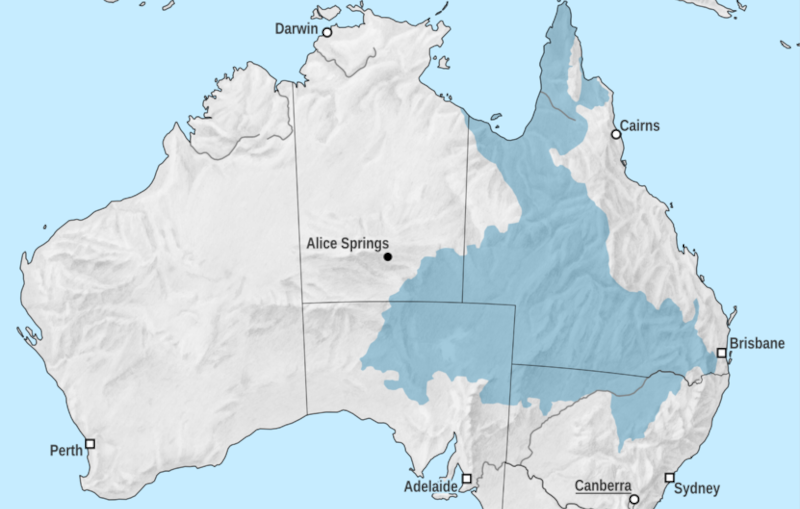Can Australia trust Glencore with the Great Artesian Basin?
March 11, 2024
If you watch a TV channel that airs commercial advertising (my preference is SBS) no doubt you would have seen the recent advertisement by Glencore. The ad advises the viewing public: The world needs natural resources to power our future. For 25 years Glencore has responsibly mined for metal and minerals that advance our everyday life that power our homes and businesses and are used to create almost everything around us from smart phones to electric cars to renewal energy for a low carbon future while becoming one of the worlds largest mining companies you probably never heard of. Glencore advancing everyday life.
The advertisement does not clearly identify if it is referring to Glencore plc, the multinational commodity trading and mining company based in Switzerland or to Glencore Pty Ltd, its Australian subsidiary or to any one or more of its many subsidiaries located around the world. While the advertisement contains a reference to the website of the Australian subsidiary, (on which there appears 3 other videos promoting the green credentials of the company), reference to the company being one of the worlds largest mining companies would indicate that it refers to the Swiss parent company, including its subsidiaries (Glencore).
I normally wouldnt be concerned about a corporate advertisement of the type promoted by Glencore. Except, the reference to the time Glencore claims to have mined responsibly, may be false or misleading to the public.
A question that first must be answered is what is meant by the statement responsibly mined? Does it involve a narrow interpretation that includes only the exploration, mine development, extraction and shipment of minerals and metals? Or to a broader definition which includes those elements but also the rights of employees, occupational, health & safety; treatment of local and indigenous people, taxation obligations, and compliance with the law, particularly in relation to bribery and corruption. If the narrow interpretation is adopted, then the claim of responsible mining might be true. But, if the broader definition is applied together with the 25 year time frame, then the public might be right in holding a view that the claim by Glencore is false or misleading.
The advertisement fails to mention that the Queensland government once threatened to close Glencore mines for failing to properly monitor coal dust levels in its mines. And that elevated levels of lead in the air, soil and drinking water were detected in Mount Isa where Glencore operated a mine. While in the Democratic Republic of the Congo, a Glencore subsidiary was accused of dumping raw acid and profiting from children working in underground mines. An accusation that was denied by Glencore and never proven.
However, Glencore has been convicted of criminal offences. In May 2022, subsidiary Glencore Ltd pleaded guilty to conspiracy to commit commodity price manipulation in the United States. The company engaged in a multi-year scheme to manipulate fuel oil prices at two commercial shipping ports in the U.S. The plea agreement involved the company accepting a criminal fine of USD 341,221,682 together with the criminal forfeiture of USD144,417,203, the latter representing the amount unlawfully earned by the company. And in May 2023, Glencore pleaded guilty in the United States to a single count of conspiring to violate the Foreign Corrupt Practices Act. The company was ordered to pay a fine of $US428,521,173 together with $US272,185,792 in criminal forfeiture. For over a decade, Glencore subsidiaries paid more than $100 million in bribes to officials in Brazil, Cameroon, Equatorial Guinea, Nigeria, Venezuela, Ivory Coast, and the Democratic Republic of the Congo to win or retain business or avoid audits. The bribes were concealed using inflated invoices, sham consulting agreements, and intermediary companies to make corrupt payments. And in late 2023, 197 investment funds sought damages from Glencore for allegedly making misleading or untrue statements in prospectuses to cover up corruption.
The company has been trying to clean up its reputation. People involved in past scandals have been disciplined or let go and new standards implemented to combat corruption. But if Glencore has admitted liability, why continue to raise its past behaviour? Should it not be entitled to move on from the past and rebuild its reputation? Normally I would say yes but Glencore has decided to make character an issue in the court of public opinion. In criminal cases, evidence of bad character is inadmissible, and if it exists, the prosecution cannot introduce it unless the defence raises the issue of character. For example, a person on trial for rape states in their defence that they have never harmed another person. If that person has convictions for assault or sexual offences, then evidence of those convictions can be admitted in evidence to rebut the claim. Using the expanded definition, Glencore by claiming it has responsibly mined for 25 years is not being honest with the Australian and global public. Had Glencore simply stated what it is doing since the convictions, then the accuracy of its claim would not be questioned. By referring to a 25 year history, then all past activities are entitled to be raised and questioned.
Glencore is currently seeking approval to store waste carbon dioxide from a Queensland carbon capture and storage project in a Great Artesian Basin aquifer. Many groups are opposed to the proposal. Glencore claims that the carbon capture and storage trial is supported by robust science. It rebuts claims made by opponents as being misleading. However, Glencore should understand, that if any of its claims in relation to a project are to be believed, it must be totally honest and transparent in public statements about its past.
Glencore has still a lot to learn about ethical corporate behaviour.
